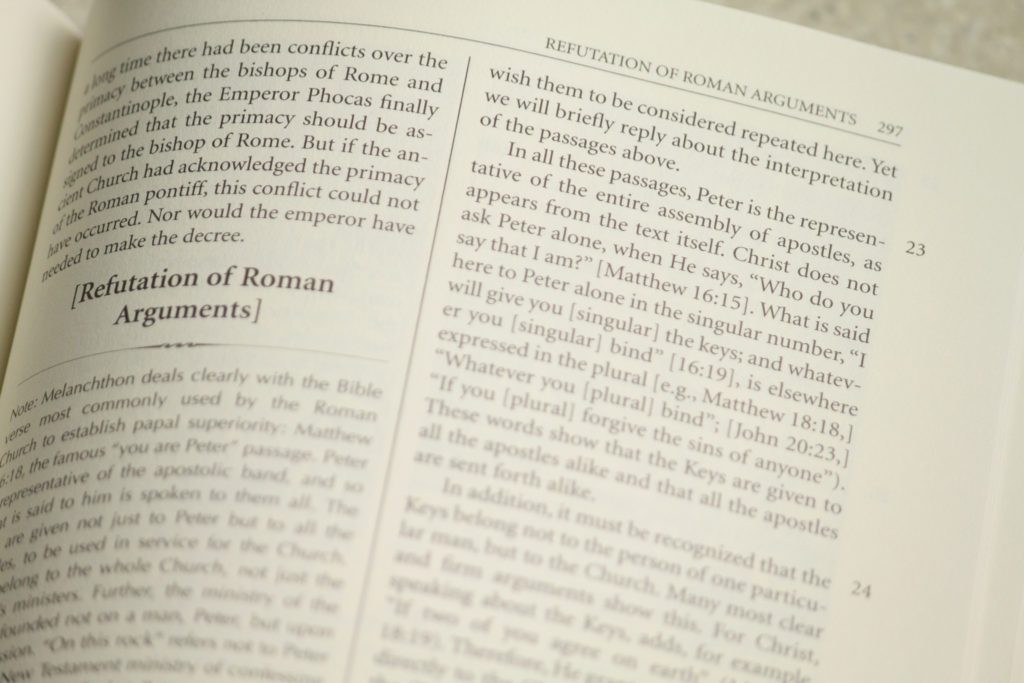
History
There aren’t many historic household traditions for the Confession of St. Peter other than attending a Church service—which you should do if you have the opportunity!
In light of that, for the tradition connected with the Confession of St. Peter, commemorated on January 18th, we wanted to bring you back to the Lutheran Confessions and this passage from the Apology of the Augsburg Confession that describes how Christians traditionally celebrate any of the saints through whom Christ has worked: giving thanks for God’s mercy as shown in the saint, gaining strength for our own faith, and imitating their faith and virtues.
Indeed, many Christians on this day have done exactly what the Apology prescribes, gaining strength for their own faith from St. Peter’s bold confession of Christ and giving thanks for the example of confession that God gave us in him.
As we do this today, we are blessed to be able to turn to our Church’s own confession of faith, which teaches us to give thanks for Peter’s confession and strengthens our faith by drawing out the consequences of his confession for us today.
The Keys to Heaven
For your observance of the Confession of St. Peter, we recommend that you turn to one of the less known confessions of the Lutheran Church: the Treatise on the Power and Primacy of the Pope. This document deals at length with Peter’s confession and helps us to observe the day as the Apology indicated above.
In this passage from the Treatise, Philip Melanchthon shows how the confession that St. Peter made—his proclamation of Jesus as the Christ—underlines our Lord’s ministry here on earth. He states that that ministry first comes from the Word given to “apostles, prophets, pastors, teachers,” etc., and then disperses that Word, finding hearts who “receive and cling to it,” thus completing Jesus’ mission.
As the Apology says, this confession is the rock and foundation upon which the Church is built. Indeed, our whole faith is built on it. This reassures us that we, too, can be bold in our confession, knowing that we join St. Peter and all believers who have gone before us also confessing Jesus as Christ!
You can find the text of paragraphs 22-30 of the Treatise in your own Book of Concord, at this link, or printed below, and we encourage you to take the time to read it and share it with those in your household as you join the Church in commemorating St. Peter’s confession and reflecting on the way that our Lord has preserved his Church throughout the centuries.

“But they cite against us certain passages, namely, Matt. 16:18f : Thou art Peter, and upon this rock I will build My Church; also: I will give unto thee the keys; also John 21:15: Feed My sheep, and some others. But since this entire controversy has been fully and accurately treated elsewhere in the books of our theologians, and everything cannot be reviewed in this place, we refer to those writings, and wish them to be regarded as repeated. Yet we shall reply briefly concerning the interpretation [of the passages quoted].
In all these passages Peter is the representative of the entire assembly of apostles [and does not speak for himself alone, but for all the apostles], as appears from the text itself. For Christ asks not Peter alone, but says: Whom do ye say that I am? And what is here said [to Peter alone] in the singular number: I will give unto thee the keys; and whatsoever thou shalt bind, etc., is elsewhere expressed [to their entire number], in the plural Matt. 18:18: Whatsoever ye shall bind, etc. And in John 20:23: Whosesoever sins ye remit, etc. These words testify that the keys are given alike to all the apostles and that all the apostles are alike sent forth [to preach].
In addition to this, it is necessary to acknowledge that the keys belong not to the person of one particular man, but to the Church, as many most clear and firm arguments testify. For Christ, speaking concerning the keys adds, Matt. 18:19: If two or three of you shall agree on earth, etc. Therefore he grants the keys principally and immediately to the Church, just as also for this reason the Church has principally the right of calling. [For just as the promise of the Gospel belongs certainly and immediately to the entire Church, so the keys belong immediately to the entire Church, because the keys are nothing else than the office whereby this promise is communicated to every one who desires it, just as it is actually manifest that the Church has the power to ordain ministers of the Church. And Christ speaks in these words: Whatsoever ye shall bind, etc., and indicates to whom He has given the keys, namely, to the Church: Where two or three are gathered together in My name. Likewise Christ gives supreme and final jurisdiction to the Church, when He says: Tell it unto the Church.]
Therefore it is necessary that in these passages Peter is the representative of the entire assembly of the apostles, and for this reason they do not accord to Peter any prerogative or superiority, or lordship [which he had, or was to have had, in preference to the other apostles].
However, as to the declaration: Upon this rock I will build My Church, certainly the Church has not been built upon the authority of man, but upon the ministry of the confession which Peter made, in which he proclaims that Jesus is the Christ, the Son of God. He accordingly addresses him as a minister: Upon this rock, i.e., upon this ministry. [Therefore he addresses him as a minister of this office in which this confession and doctrine is to be in operation and says: Upon this rock, i.e., this preaching and ministry.]
Furthermore, the ministry of the New Testament is not bound to places and persons as the Levitical ministry, but it is dispersed throughout the whole world, and is there where God gives His gifts, apostles, prophets, pastors, teachers; neither does this ministry avail on account of the authority of any person, but on account of the Word given by Christ.
Nor does the person of a teacher add anything to this word and office; it matters not who is preaching and teaching it; if there are hearts who receive and cling to it, to them it is done as they hear and believe.] And in this way, not as referring to the person of Peter, most of the holy Fathers, as Origen, Cyprian, Augustine, Hilary, and Bede, interpret this passage: Upon this rock. Chrysostom says thus: “Upon this rock,” not upon Peter. For He built His Church not upon man, but upon the faith of Peter. But what was his faith? “Thou art the Christ, the Son of the living God.” And Hilary says: To Peter the Father revealed that he should say, “Thou art the Son of the living God.”
Therefore the building of the Church is upon this rock of confession; this faith is the foundation of the Church.
And as to that which is said John 21:15: Feed My sheep, and, Lovest thou Me more than these? it does not as yet follow hence that a peculiar superiority was given Peter. He bids him “feed,” i.e., teach the Word [the Gospel], or rule the Church with the Word [the Gospel], which Peter has in common with the other apostles.”
Source: The Book of Concord


[…] The Confession of St. Peter reading […]